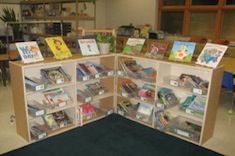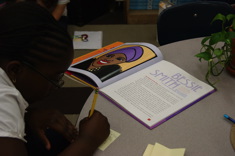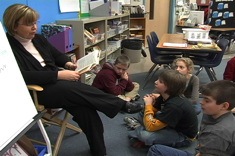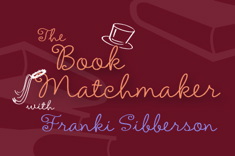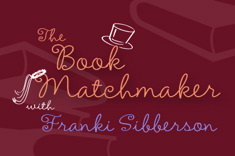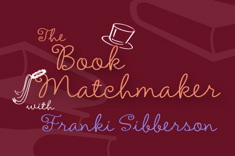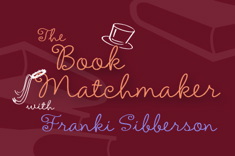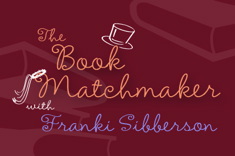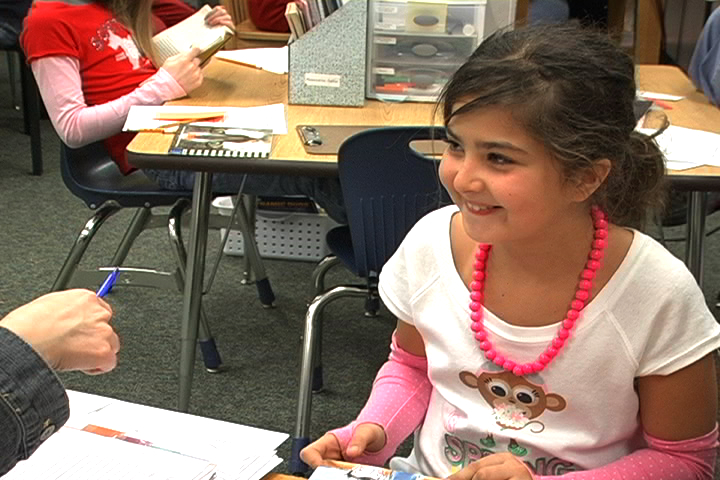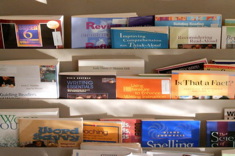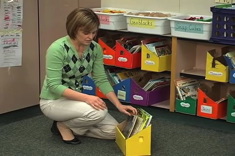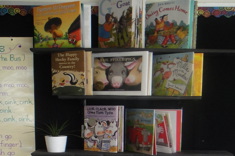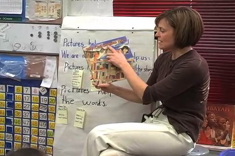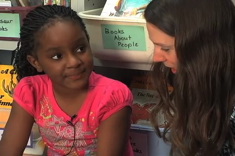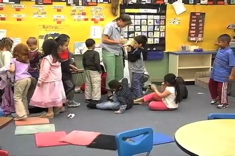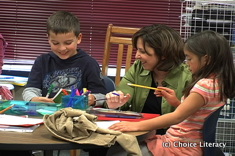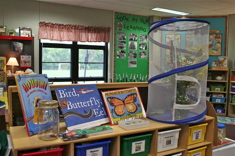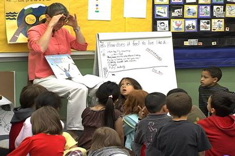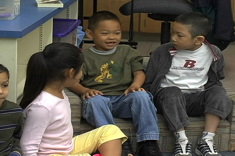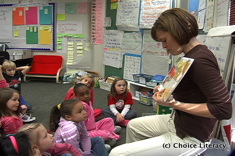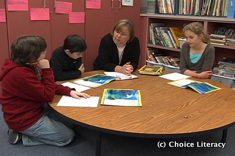Booklists
There are so many wonderful new children's and young adult books published each year -- and there is a lot of dreck out there too. We aim to be curators as we sort through, organize, and group books so that you can find just what you need. Whether it's mentor texts for a unit on persuasive writing, or just-right books for a fifth-grade English language learner, we've scoured lists of award winners, recommendations from colleagues, and the Kidlitsophere to come up with these lists.
Latest Content
Social Justice Picture Books
If you’re looking for a read aloud to spark some discussions about making a difference in the world, you might enjoy Ruth Shagoury’s new booklist of children’s literature with a social justice theme.
Creating a Kindergarten Classroom Library
Mandy Robek finds herself overwhelmed when moving from a 3rd grade to kindergarten classroom. Her therapy? Rolling up her sleeves and designing a kindergarten classroom library.
Young Learners and Martin Luther King Day (BOOKLIST)
Teachers of young learners face special challenges in honoring Martin Luther King and dealing with the violent nature of his death at the same time. Mandy Robek offers some insights into how to celebrate King's life with even the youngest students.
Reflections on a Year of Read Alouds
Karen Terlecky mulls over a year of read alouds in her 5th grade classroom as she makes plans for the coming year.
Book Matchmaker: A Friendship Theme for Literature Circles
Franki Sibberson shares her top picks for literacy circles with a friendship theme. This is an excellent theme for building community any time of year.
Book Matchmaker: Texts to Build Stamina
In this installment of Book Matchmaker, Franki Sibberson has suggestions for books to build reading stamina in students.
Book Matchmaker: Teaching Inferring to Intermediate Students
In this installment of Book Matchmaker, Franki Sibberson discusses the challenges of finding a range of books to teach the concept of inferring to grades 3-5 students.
Book Matchmaker: Characters Across the Grades
In this installment of Book Matchmaker, Franki Sibberson provides a range of books for teaching character development in fiction for grades 3-5 students.
Book Matchmaker: Teaching Point of View
In this installment of Book Matchmaker, Franki Sibberson provides a range of books for teaching point of view for grades 3-5 students.
Book Matchmaker: Helping a Struggling Reader in 5th Grade
In this installment of Book Matchmaker, Franki Sibberson shares books and genres a struggling 5th grader might enjoy.
Books to Celebrate Earth Day
Earth Day in April is a great time to get outdoors with a good book! Franki Sibberson shares some of her favorite texts linked to Earth Day.
Book Matchmaker: Short Vowel Practice with Older Students
In this installment of Book Matchmaker, Franki Sibberson tackles the tough question of how to find texts for students who need help with short vowels, but are too old to enjoy many primary texts.
Book Matchmaker: Texts to Inspire Our Youngest Readers and Writers
In this installment of the Book Matchmaker series with Franki Sibberson, Franki helps first-grade teacher Danielle think through what books might spark better writing in her young students who are mostly interested in toys and video games.
Using Picture Books to Spice Up Vocabulary Instruction (BOOKLIST)
Picture books are a terrific tool for vocabulary instruction – students have so much fun reading them they are hardly aware of all the new words they are picking up. Franki Sibberson shares her top picks for spicing up vocabulary instruction in this booklist.
Great Little Books for Professional Book Clubs
What books are most likely to succeed in teacher study groups? Shari Frost shares her criteria for books teachers will embrace. . .and actually read with enthusiasm.
Reorganizing Books in the Reading Support Classroom
Katie DiCesare helps her mom, a reading support teacher, reorganize her materials to better serve students.
Injecting Writing into . . . Everything: Ellipsis Stories
"DOT DOT DOT" – a phrase made famous in Mama Mia, it's also the spark for some writing instruction linked to read alouds from Heather Rader.
Save the Picture Books!
Are picture books endangered species? Sales are plummeting, in part because parents and teachers are pushing students into chapter books at ever-younger ages. Shari Frost turns a critical eye on her own practice, and brainstorms practical ways to promote the value of picture books in classrooms.
Primary Series Study
Katie DiCesare describes the primary series study unit she completes with her 1st and 2nd graders, combining reading, writing, and community building.
Books and Activities from Around the World to Celebrate the Holiday Season
People around the world celebrate the holidays in different ways, and that diversity provides wonderful learning opportunities this time of year. Stella Villalba shares literary holiday projects and a booklist around the themes of “peace” and “wishes” that might help students find common ground in family traditions.
Injecting Writing into Everything: Prediction Stories
What happens between kindergarten and upper elementary grades to make students more hesitant about making predictions? Heather Rader has books and teaching suggestions for building prediction skills.
Characters I Know Too Well
Books with themes of sexual abuse may be the most difficult for many of us to grapple with, if only because the issue horrifies us. Yet for some abused teens, a book may be the needed catalyst for breaking their silence about what's going on outside school. Andie Cunningham shares an annotated booklist on this tough topic.
Using Picture Books to Teach Theme in Grades 3-6
Many students in the upper elementary and middle school grades shun all picture books, yet they are an invaluable resource for teaching sophisticated literacy concepts. Franki Sibberson explains how to teach the concept of theme using picture books in this booklist.
Ready-to-Go Readers’ Theater Books
If you want to do more with readers’ theater to promote fluency, but can’t afford one of those expensive kits, you’ll enjoy this booklist. Shari Frost has compiled her favorite readers’ theater books with texts and illustrations students love.
“This Could Be Our Family”: Books for Children with Lesbian and Gay Parents
Andie Cunningham considers the diversity in how “families” are defined in children’s literature, as well as how some newer books can support children with lesbian or gay parents in our new booklist.
Books for Strategy Studies
Andie Cunningham has some thoughtful recommendations for books to use in strategy studies.
Literacy Learning on Presidents Day (BOOKLIST)
Here are some books to spice up your teaching in February on Presidents Day, or any time U.S. presidents come up in your curriculum.
Bilingual (English/Spanish) Books that Celebrate Language, Family and Culture
Stella Villalba shares her favorite bilingual (English/Spanish) books for helping young English language learners feel at home in new classrooms early in the year.
Accurate But Not Quite Fluent: Books for Second-Grade Readers in Transition
Many second-grade readers are in transition – they can decode almost any text and are eager to read chapter books. Yet many don't have the stamina for reading even very short chapter books on their own. Katie DiCesare presents a booklist of her top picks of new fiction and nonfiction books that might engage and challenge her second-grade students.
Great Books to Share When Studying the Ecosystem (BOOKLIST)
Karen Terlecky shares books for studying the ecosystem in our this booklist.
Browse Content By
Type
Category
- Assessment Tools
- Big Fresh Archives
- Booklists
- Choice Numeracy
- Classroom Design
- Common Core
- Community Building
- Conferring
- Content Literacy
- Digital Literacy
- English Language Learners
- Equity
- Family Relations
- Free Samples
- Guiding Groups
- Leadership
- Literacy Coaches
- Mentor Texts
- Minilessons
- New Teacher Mentors
- Podcasts
- Poetry
- Quote Collections
- Reading Strategies
- Self Care
- Struggling and Striving Learners
- Talking and Listening
- Teacher Study Groups
- Teaching Reading
- Teaching Writing
- Word Study and Vocabulary
Author
- Melissa Quimby
- Nawal Qarooni
- Gwen Blumberg
- Julie Cox
- The Lead Learners
- Hannah Tills
- Josie Stewart
- Ruth Metcalfe
- Mallory Messenger
- Becca Burk
- Jodie Bailey
- Vivian Chen
- Mary Brower
- Tiffany Abbott Fuller
- Stephanie Affinito
- Ruth Ayres
- Leigh Anne Eck
- Heather Fisher
- Shari Frost
- Julie Johnson
- Suzy Kaback
- Gigi McAllister
- Shirl McPhillips
- Melanie Meehan
- Cathy Mere
- Debbie Miller
- Tara Barnett and Kate Mills
- Tammy Mulligan
- Dana Murphy
- Bitsy Parks
- David Pittman
- Brenda Power
- Heather Rader
- Matt Renwick
- Mandy Robek
- Christy Rush-Levine
- Gretchen Schroeder
- Jen Schwanke
- Brian Sepe
- Katherine Sokolowski
- Stella Villalba
- Jennifer Vincent
Grade Level
Choice Literacy Membership
Articles
Get full access to all Choice Literacy article content
Videos
Get full access to all Choice Literacy video content
Courses
Access Choice Literacy course curriculum and training


